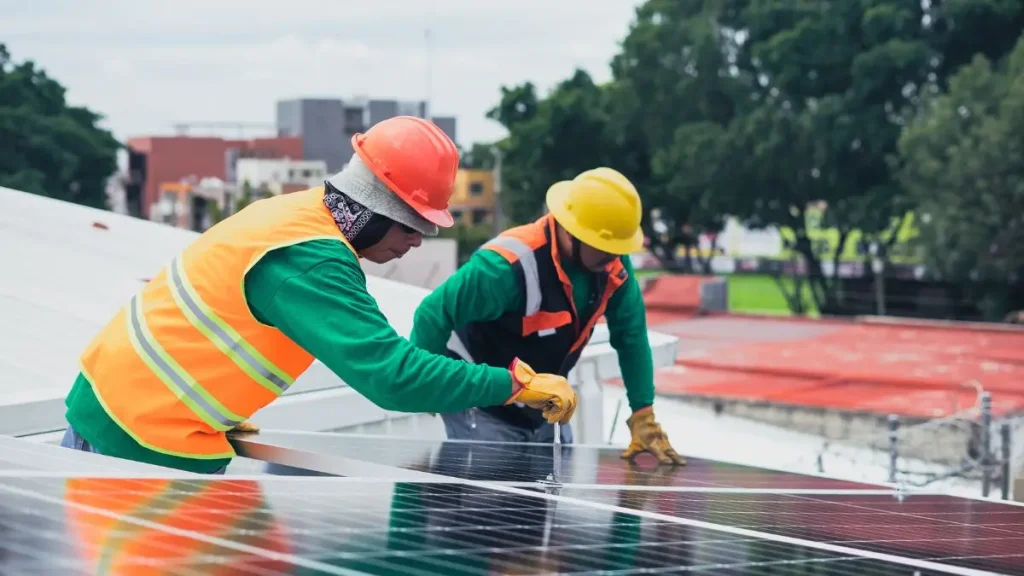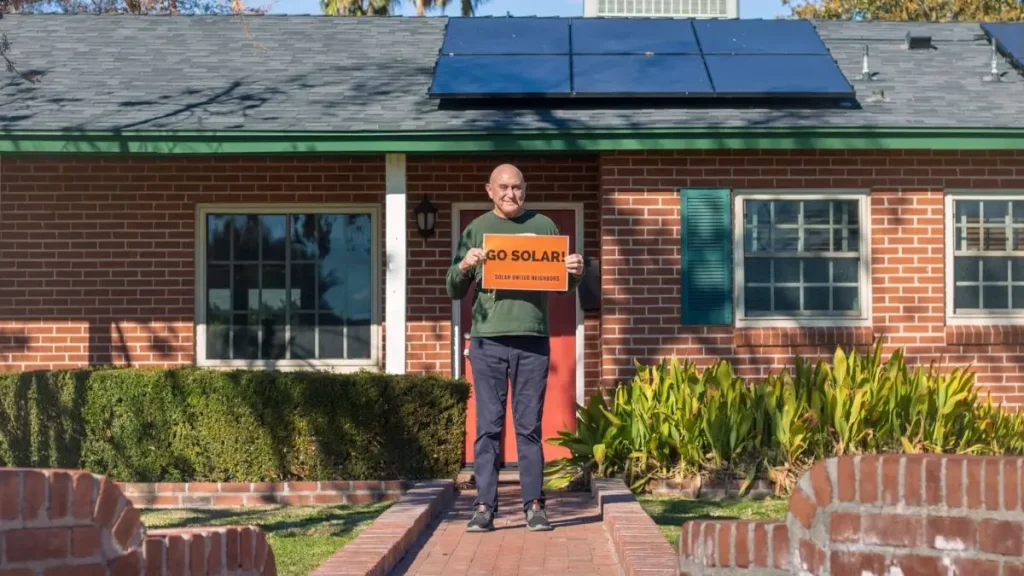Florida Veteran Faces Foreclosure Over $40K Solar Panel Loan
I want you to imagine this for a second: you serve your country, come home injured, try to build a quiet life in Florida—and then one day, you find out you might lose your house. Not because of bad spending, not because you missed mortgage payments, but because of a solar panel loan you barely understood.
That’s exactly what happened to Esteban Ortiz, a disabled Army veteran living in Pasco County. He signed up for a solar panel installation through what seemed like a government-backed program. But today, he’s drowning in debt—over $40,000—and facing the real risk of foreclosure.
I came across Ortiz’s story on ABC Action News, and let me tell you—this isn’t just one man’s bad luck. It’s a warning for thousands of homeowners being targeted by aggressive solar sales tactics and confusing loan structures.
A lot of people are being sold dreams under the banner of “clean energy,” when in reality, they’re locked into high-interest, poorly explained loans. And the worst part? Many of them don’t realize their homes are on the line until it’s too late.
If you’re a homeowner—or even just someone trying to understand how financing schemes like PACE work—you need to see this story for what it is: a system failure that hides behind good intentions.
So let’s unpack this together. I’ll show you what went wrong, how it could happen to anyone, and what you should never ignore before signing a clean energy contract.
Now I want to hear from you: Have you or someone you know been offered a solar deal that sounded “too good to be true”? Drop your experience in the comments below.
Understanding the PACE Program – Promise vs. Reality
When Esteban Ortiz signed up for solar panels, it sounded like a smart move. Clean energy, no upfront costs, and part of a program that sounded “official.” That’s how PACE loans are usually pitched.
PACE stands for Property Assessed Clean Energy. It’s a way to finance home improvements—like solar panels—by adding the cost to your property taxes. No credit check, no cash needed, and contractors often say it’s “approved by the government.”
Most homeowners don’t get the full picture. They aren’t told that this isn’t a regular loan. It’s a lien. That means if you fall behind on payments, your county can foreclose on your home—even if you’re current on your mortgage.
Contractors often skip over that part. And they rarely explain how interest adds up, or that selling your home with a PACE lien can be nearly impossible. You’re locked in, whether you realize it or not.
In Ortiz’s case, no one clearly told him what he was signing. That’s not a one-off mistake—that’s a pattern.
The Financial Fallout – From Solar Panels to Foreclosure
Ortiz’s “energy upgrade” quickly turned into a financial nightmare. As Moneywise reported, his solar system was financed through PACE at a cost of over $40,000—a debt that quietly slipped into his property tax bill.
The payments started stacking up. Interest, fees, and the structure of the loan made it almost impossible to keep up. Ortiz, a disabled veteran on a fixed income, was suddenly behind—and facing foreclosure.
He never missed a mortgage payment. But because of this hidden debt, his home is now at risk of being taken away by the county. Think about that: a man who served his country could lose his house because of solar panels he was told would save him money.
This isn’t rare. Thousands of homeowners across Florida—especially elderly, low-income, and disabled residents—are being caught in the same trap. The sales pitch is polished. The reality? Not so much.
This section matters because it shows the real financial risk behind the clean-energy dream. And it’s a risk most people never see coming until it’s too late.
Have you faced unexpected costs or confusing terms in a solar or home improvement loan? Share your experience in the comments—your story might help someone avoid the same mistake.
The Role of Solar Companies – Sales Tactics and Accountability

Here’s the part that stings most: many of these problems don’t start with the loan. They start with the sales pitch.
In Esteban Ortiz’s case, the contractors walked him through the basics, showed him paperwork, and made it sound like a simple, government-approved program. No stress, no surprises. Just clean energy that “pays for itself.”
But there’s a reason this keeps happening to people like Ortiz. The solar sales industry has become a magnet for aggressive tactics, misleading claims, and in many cases, outright deception.
Some reps present PACE as “free,” or say the cost will be offset by your energy savings—which, in reality, often doesn’t happen. Others fail to explain that these are secured loans tied to your property, not just a monthly utility swap.
And when things go wrong? The solar company disappears, or blames the lender. The lender blames the program. And the homeowner—who trusted the pitch—is left to clean up the mess.
There’s no central accountability. No one double-checks if the homeowner fully understood what they were signing. And unless you already know how this stuff works, you won’t see the red flags until they’re in your mailbox.
Ever been rushed into signing something that didn’t feel right? Tell us how a sales rep tried to pressure you—let’s call out the patterns together.
Legal Landscape – Consumer Protection and Recourse
Now let’s talk about what can actually be done when something like this happens.
The sad truth is, most homeowners don’t know where to turn. And many don’t realize they’ve been misled until they’re already in default.
But this isn’t flying under the radar anymore. Florida’s Attorney General’s Office has actually issued warnings about deceptive solar financing practices and PACE abuse. On My Florida Legal, you’ll find multiple alerts urging homeowners to read the fine print, verify contractor licenses, and understand their long-term obligations before signing anything.
The AG has even launched investigations into some solar contractors who were accused of misleading consumers—especially the elderly and veterans. That shows this isn’t just about bad luck. It’s about bad actors.
If you’re in a similar situation, here are a few things you can do:
- File a complaint with the Florida Attorney General’s Office.
- Contact your local tax collector for information about removing or disputing the lien.
- Speak with a housing attorney who understands PACE and property tax issues.
- Check your contractor’s history with the Better Business Bureau or Florida DBPR.
This section matters because people need to know there are steps they can take—and that they’re not alone. Ortiz’s story is tragic, but it’s also a wake-up call. And Florida officials are starting to respond.
There’s even a WhatsApp group where stories like these are being discussed—real homeowners talking about confusing solar deals, hidden liens, and what actually helped them fight back. If you’re navigating something similar, those insights can be a lifeline.
Broader Implications – The Intersection of Renewable Energy and Consumer Rights

Let’s be clear: solar energy isn’t the problem here.
Going solar can be a smart, eco-friendly move—and in many cases, it pays off. But when clean energy gets tangled in confusing finance schemes, weak oversight, and predatory sales, the whole purpose falls apart.
What’s happening to homeowners like Esteban Ortiz isn’t just an isolated case. It’s a sign that the renewable energy industry, especially at the residential level, is outpacing the protections meant to keep people safe.
The federal push for green energy is strong. States like Florida offer incentives and programs to support adoption. But when private contractors and third-party lenders exploit that momentum, consumers—especially vulnerable ones—pay the price.
And the data backs this up. Complaints about solar financing have increased sharply in states using PACE-style programs. Social media is full of frustrated homeowners sharing stories of unexpected tax hikes, lawsuits, and contractors who vanished after installation.
It’s a messy middle ground where good intentions meet bad execution. And unless stricter consumer protections are put in place, these stories will keep repeating.
And sadly, it’s not just solar loans. From predatory lenders to broken safety nets, vulnerable people across Florida are slipping through the cracks. Like this 78-year-old woman, who now lives in her car and survives on one meal a day.
Expert Insights – Navigating Solar Financing Safely
So if you’re thinking about going solar—how do you protect yourself?
I asked around in the clean energy space, and here’s what experts consistently say:
- Never sign anything on the same day as a sales pitch. If it feels rushed, that’s a red flag.
- Always ask: Is this a lien-based loan? If it’s through a program like PACE, get a second opinion before moving forward.
- Get a quote from your utility company. Ask them to estimate real energy savings. Compare that to what the solar rep is promising.
- Use state resources. Florida has a contractor license lookup at myfloridalicense—check who you’re dealing with.
- Avoid “no-money-down” traps. They sound appealing but often hide the most aggressive terms.
You can also explore non-PACE financing options—like traditional solar loans, local credit unions, or federal incentives that don’t come with home liens.
One clean energy consultant I spoke to put it best:
“If you can’t clearly explain your loan terms to a friend without checking your paperwork—you shouldn’t sign it.”
It’s advice worth taking seriously. Clean energy should empower people, not put their homes on the line.
Conclusion
Esteban Ortiz didn’t set out to make a bad decision. He trusted what sounded like a smart upgrade. Clean energy. No upfront cost. Government-backed financing. That’s what he was told.
What he got instead was a $40,000 debt, a foreclosure warning, and a house he might lose.
His story isn’t just sad—it’s avoidable. And that’s the point.
As solar adoption grows, so does the need for transparency, regulation, and better consumer education. Programs like PACE can work—but not when contractors cut corners and people are left in the dark about the fine print.
If there’s one thing to take away, it’s this: never trust the pitch without understanding the paperwork. Ask hard questions. Read everything. Talk to your tax collector, your lender, your utility company—anyone who isn’t making a commission off your deal.
Because once that lien hits your property taxes, it’s already too late to back out.
Ortiz’s case is a red flag waving for every homeowner in Florida and beyond. If you’re being approached with a solar offer, slow down. And if you’ve already signed and something feels off, speak up—before it spirals.
Have you been pitched a solar deal that felt shady or confusing? Or are you considering one now and unsure about the terms? Drop your thoughts or questions below. Let’s help each other stay informed.
Disclaimer: This article is intended for informational purposes only. It does not constitute legal, financial, or energy policy advice. If you are dealing with a solar financing issue, PACE loan, or potential foreclosure, consult a licensed attorney, certified financial advisor, or your local tax authority.


